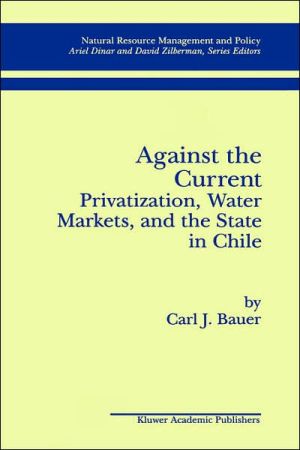Against the Current
In 1981 Chile's military government dictated a new Water Code that radically changed the country's previous water rights system by strengthening private property rights, favoring market incentives, and reducing state regulation. Against the Current: Privatization, Water Markets, and the State in Chile is the first empirical and interdisciplinary study of water markets in Chile, which is the leading international example of free market water policies.\ Against the Current: Privatization,...
Search in google:
In 1981 Chile's military government dictated a new Water Code that radically changed the country's previous water rights system by strengthening private property rights, favoring market incentives, and reducing state regulation. Against the Current: Privatization, Water Markets, and the State in Chile is the first empirical and interdisciplinary study of water markets in Chile, which is the leading international example of free market water policies. Against the Current: Privatization, Water Markets, and the State in Chile challenges the glowing reports given by neoliberals in Chile and the World Bank, showing that the results of this economic experiment have actually been rather mixed. Within the agricultural sector the Water Code has worked fairly well, although the market incentives to conserve water have been ineffective and water rights trading has been less active than expected. The Code's impact has been more negative at the level of river basins, where the institutional framework has revealed critical flaws in coordinating multiple water users and resolving conflicts. Against the Current: Privatization, Water Markets, and the State in Chile combines law, political economy, and geography to analyze the disadvantages, problems, and wider contexts of water markets. This book will appeal to everyone interested in property rights, market-friendly environmental policies, the political economy of sustainable development, and the intersection of economics with law and institutions. Booknews A study of water markets in Chile in the context of the 1981 Water Code that changed the country's previous water rights system by strengthening private property rights, favoring market incentives, and reducing state regulation. Topics include the origins and politics of the 1980 constitution; Chilean water law up to the 1970s; the legal and political history of the 1981 Water Code; the water market in practice from 1980 to 1995; and hydroelectricity and river basin conflicts in South-Central Chile. The author concludes that the results of this economic experiment have been mixed, which challenges the uniformly positive reports given by neoliberals in Chile and the World Bank. The text is based on the author's two and a half years in Chile, during which he conducted interviews, gathered documentary material, and compiled archival data. Annotation c. by Book News, Inc., Portland, Or.
List of MapsList of TablesAcknowledgments1Introduction12Blueprint for the Neoliberal Model: Law, Economics, and Politics in the 1980 Constitution113Water Rights and the Law of the Pendulum: Legal and Political History of the 1981 Water Code334Bringing Water Markets Down to Earth: Water Rights Trading in Practice, 1980-1995515Private Property and River Basins: Water Use Conflicts, the Market Model, and the Courts796Conclusions119Bibliography125Index159
\ BooknewsA study of water markets in Chile in the context of the 1981 Water Code that changed the country's previous water rights system by strengthening private property rights, favoring market incentives, and reducing state regulation. Topics include the origins and politics of the 1980 constitution; Chilean water law up to the 1970s; the legal and political history of the 1981 Water Code; the water market in practice from 1980 to 1995; and hydroelectricity and river basin conflicts in South-Central Chile. The author concludes that the results of this economic experiment have been mixed, which challenges the uniformly positive reports given by neoliberals in Chile and the World Bank. The text is based on the author's two and a half years in Chile, during which he conducted interviews, gathered documentary material, and compiled archival data. Annotation c. by Book News, Inc., Portland, Or.\ \








